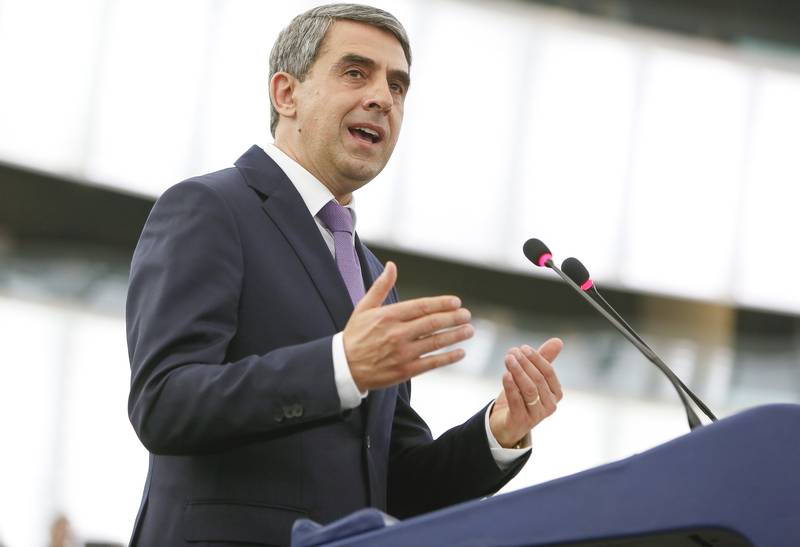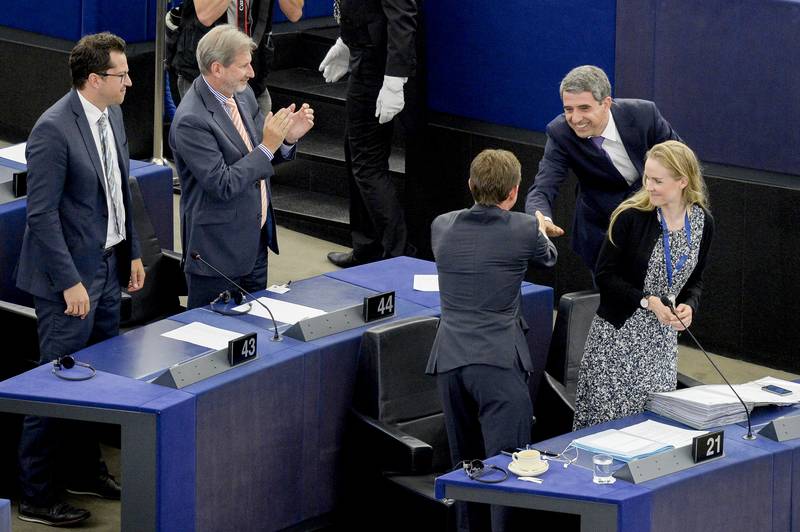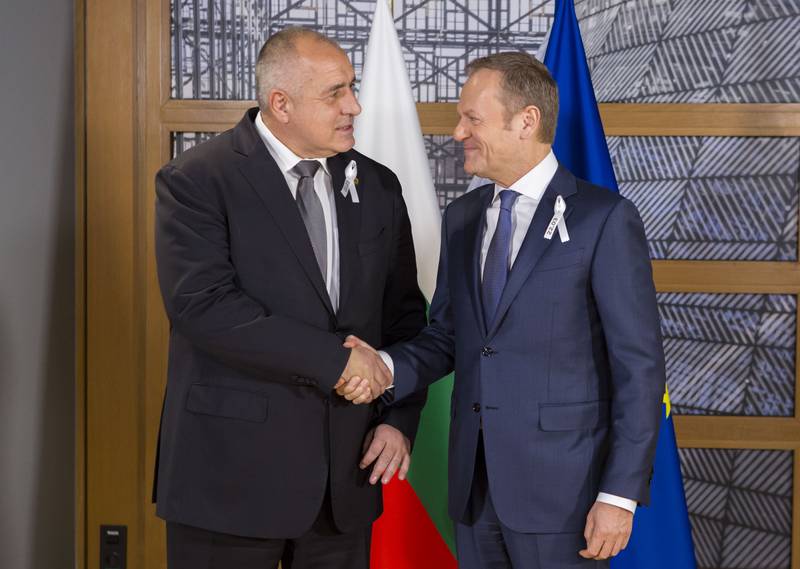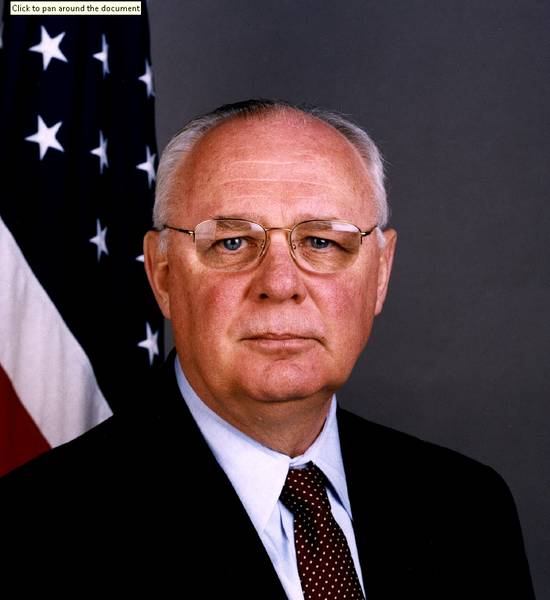Now Bulgarians Need to Unite behind the President's Speech
Adelina Marini, June 10, 2016
 The speech of President Rosen Plevneliev to the European Parliament on June 8 was much needed. We needed a high-ranking politician telling us clearly where he sees Bulgaria placed in today’s complex geopolitical situation. I have been asked many times in Brussels why is there no information about Bulgaria’s position on this subject or that, what is the country’s orientation, where is it placed on the European coordinate system. It was important to finally hear the Bulgarian voice on the subject of what Union do we want to live in, what are our fears and what are our dreams. In this sense, the head of state’s speech gave some general guidelines without going into details. At the same time, we must not forget that the President has no executive powers, his ideas are not shared by everyone in Bulgaria, and some of them reveal our weak spots. This is why, it is important we do everything possible to unite around it and work on clarifying the details. Today this is more important than ever, because there are big changes coming in the EU, which we need to be prepared for.
The speech of President Rosen Plevneliev to the European Parliament on June 8 was much needed. We needed a high-ranking politician telling us clearly where he sees Bulgaria placed in today’s complex geopolitical situation. I have been asked many times in Brussels why is there no information about Bulgaria’s position on this subject or that, what is the country’s orientation, where is it placed on the European coordinate system. It was important to finally hear the Bulgarian voice on the subject of what Union do we want to live in, what are our fears and what are our dreams. In this sense, the head of state’s speech gave some general guidelines without going into details. At the same time, we must not forget that the President has no executive powers, his ideas are not shared by everyone in Bulgaria, and some of them reveal our weak spots. This is why, it is important we do everything possible to unite around it and work on clarifying the details. Today this is more important than ever, because there are big changes coming in the EU, which we need to be prepared for.
Where are we in the European coordinate system?
In his speech, the President briefly outlined the new division of the EU. It is no longer between new and old member states, between rich and poor, South-North, East-West. The division is between Eurosceptics and pro-Europeans. This is why, it was extremely important that the President began his speech with the words “I am a proud pro-European President of a pro-European nation”. Later he explained why this is important – it is impossible, he said, to convince Euro-sceptics, so pro-Europeans must be mobilised. Alas, he did not say how this will happen, neither did he share any Bulgarian experience (of which, by the way, there is none), but set the tone – one should declare clearly from the European public scene which side one is on.
The problem with this statement by Mr Plevneliev is that for the first part he can guarantee completely, because it deals with his personal beliefs, but we cannot be sure about the second part, judging by the daily debates in the media environment or social networks. Prime Minister Boyko Borissov, although claiming to be pro-European, with his actions and words shows moderate Euroscepcis and on some occasions a large distance from Europeism. He could more often be seen together with the Eurosceptic Visegrad group, rather than in the company of pro-European leaders in the EU.
Regardless of Bulgaria being a EU member for nine years now, it still sees the EU as a bag of money, not as a civilisational choice, as a society that it needs to participate in actively, which represents a continuous process of construction and adaptation to the new realities. A community, in which the country has rights, but responsibilities as well. Moreover, there is a lack of understanding of what European values really are. Thus, one of the important elements in the President’s speech is that on several occasions he clearly stated what European values are: peace, freedom, democracy, human rights, rule of law, and solidarity. He did specifically stress on rule of law and democracy.
Another important element of Rosen Plevneliev’s speech, regarding the positioning of Bulgaria in the European coordinate system is his statement that Bulgaria is no longer a periphery state, but a front-line one. The words he chose have different meanings, because ever since the refugee crisis erupted, a front-line state means a state which is at the front line of the refugee wave. Bulgaria is not such a state and the reasons for that are not to the country’s advantage at all – wire fences being built along the border with Turkey, exercising of violence towards refugees by security authorities, poor accommodation conditions for those seeking refuge. What the head of state wanted to say is that Bulgaria is among those in the lead in the EU on several subjects – Ukraine, migration. In this context, he appealed that Bulgaria be treated as a full member, which means it should be immediately accepted in Schengen, for this will benefit European security.
This thesis is one of the weakest in his speech, for many in the EU are aware why Bulgaria is not a Schengen member yet – due to lack of trust in its judiciary, in the presence of rule of law and all that is covered by the Cooperation and Verification Mechanism, with which Bulgaria joined back in 2007 and for which the conditions to be lifted are still lacking. This is the reason why, those who are familiar with the situation in Bulgaria probably made faces when they heard the president mentioning on several occasions rule of law as something Europeans have. Unfortunately not all of them do, and tendencies along the Eastern flank of the Union, and not only, are serious. In some cases, it is about undermining democracy and building of an illiberal regime, in others – it is about trimming of rights and freedoms in the name of fighting terrorism, and in third – about the carrying out of a conservative revolution, which also leads to limiting of hard-won rights and freedoms.
Russia is our enemy. Is it?
The most controversial thesis of the Bulgarian President in terms of consensus in Bulgaria was linked to Russia. Attacks on the Kremlin were a central part of his speech. This way he positioned himself next to the most vocal critics of Putin’s regime, among which the Lithuanian President Dalia Grybauskaitė. He was, however, far meeker than Ms Grybauskaitė usually is, first of all because he possesses no executive functions, and secondly, because he is fully aware that he does not speak for all of the Bulgarians. Nevertheless, the subject of Russia is just as important at the European level for determining the position in the European coordinate system, as is the fact whether you are Eurosceptic or pro-European. One could judge by the applause in the plenary in Strasbourg that his strongly critical position towards Russia received a warm welcome.
A shortcoming of this part of his speech was that while he talked in depth about how the West should not allow itself to be pulled into the Russian game of allocation to spheres of influence, he did just that. “Are we heading towards a new Yalta Conference?”, he asked and answered: “If the West allows this, it will be a historic shame”. Further on he said that today's wise politics does not deal with creating frozen conflicts, occupying neighbours’ territories, or redrawing borders. At the same time, however, he stated that Crimea is Ukraine, and Ukraine is Europe, clearly positioning the Ukraine in the Western sphere of influence. Similar positioning he did for the Western Balkans as well, saying that if they were abandoned, they will come under the influence of former empires. This is addressed at Russia, as well as at Turkey.
Plevneliev started and ended his speech with Russia. In his opinion, the goal of Russia is to destroy the EU and the plan is so far succeeding, for the Union is stuck, instead of moving forward. Its most important engine – integration – does not run. The handbrake is pulled on enlargement, Schengen, and other important policies. This statement, however, is not completely true. Not everywhere behind blocking future EU integration one could see Russia’s handwriting, but it is surely in Russia’s interest. In this sense, it would have been important that Rosen Plevneliev dedicated more time to explaining what is Russia’s influence in a state like Bulgaria and suggest a solution. This would have meant admitting from that high tribune that Bulgaria is a frontier state, in which there is a strong geopolitical clash going on. Refraining from such a statement could be interpreted as an attempt on his part to build up his own image in the EU, rather than speaking on behalf of his country.

Besides, the handbrake on enlargement was not pulled, but rather it was openly announced that there will be no new enlargement in the next five years. The reason is simple – not a single candidate state will be ready. It is, however, fact that there is enlargement fatigue in the EU and Mr Plevneliev would have provided a strong argument, had he stated why enlargement is important to the EU itself – because it creates security both inside it and along its periphery. Bulgaria may not be the best of examples for an integrated state, but if it was not for its membership in the EU and NATO, the situation in the country would surely have been much worse. And this is a very strong argument in support of enlargement, as is well demonstrated through the example of Serbia, which is forced to make a geopolitical choice with potentially dire consequences not just to itself, but to the region and the EU in general.
Bulgaria wants more Europe
One could judge from Bulgaria’s behaviour at the European level that the country is truly pro-European and although there is Eurosceptic rhetoric heard more and more often during discussions of common European subjects, Bulgarian representatives in the Council often express pro-European positions. For example, Bulgaria is consistent in its demand for a strong supranational European Public Prosecutor's Office. This is not the only subject on which Bulgaria supports common European decisions. In the European Parliament, the President expressed these attitudes by stating that to him integration is the solution to problems. It was important that he placed the talk about integration in the context of the upcoming British referendum on the country’s EU membership, which will be held on June 23. He stated that whatever the result is, the “destructive” conversation about “Europe a la carte” must not be led.
The message is very important, because, at the moment, in the EU there are ever stronger aspirations for a looser union growing. If Great Britain stays, it will surely oppose a number of community decisions. It has committed only to not stopping integration in the euro area, but only if it does not hurt the United Kingdom’s interests. The many exceptions, which Great Britain enjoys in the EU are already acting contagious to other members. In this sense, Rosen Plevneliev missed mentioning when does he envisage Bulgaria joining the common currency. This is an important question, for two of the Baltic states joined at the peak of the euro area debt crisis with the argument that accepting the euro is the completion of their European integration. If for Bulgaria the solution to European problems truly is more integration, expectations are for it to state how is its own integration developing. To make evident the horizon, which Sofia thinks and acts with.
It is commendable that the President mentioned the Western Balkans in the context of EU integration. Bulgaria generally supports the accession of countries of the region, but rarely speaks beyond the protocol clichés, and even less often one could witness any actions in this direction. Rosen Plevneliev’s speech revealed a much deeper engagement with the region than the usually stated one. He was not specific in his statement, but made several remarks, which will resound in the region. The first one is that he quoted Gotse Delchev, reminding that he is a Bulgarian revolutionary. This was a clear message to Macedonia, often accused by Bulgaria of stealing history. The other is that he presented EU integration of the Western Balkans as a solution to the conflicts among them.
“Nationalistic doctrines that led to atrocities belong to the past”, he stated and appealed for strengthening of good neighbourly relations. In his opinion, these relations should be a clear indicator for the progress of these countries towards European-ising. The words of Plevneliev come at a time, when nationalistic rhetoric is once again “coming to fashion” in key countries of the region such as Serbia and Croatia. A strong part of his statement was his recommendation to the EU that support is extended only to those leaders, who “understand that differences should be resolved peacefully and not through proxy and propaganda wars”. We need to be firm, he urged, for if we are not, we will encourage irresponsible leaders to destabilise more.
His message has no addressee, but by all accounts it is mainly addressed at Russia. It could, however, be interpreted as aimed at Turkey as well, which under the leadership of President Recep Tayyip Erdoğan made a U-turn towards authoritarianism, and this could prove to be a source of destabilisation, including in the Balkans with the role Ankara has in Bosnia and Herzegovina. A potential addressee of these words of his could well be Serbia, where PM Aleksandar Vučić also shows authoritarian capacity.
The democracy, Sancho
The President often touched in his speech on democracy as a major EU achievement. This also was one of the elements that he was strong in words at, but Bulgaria’s experience in this sphere is catastrophic. Plevneliev stated that it is “our common duty” to defend European values, among which is democracy, but here, too, he failed to say how, nor could he share Bulgarian experience. Moreover, the Bulgarian experience speaks very badly about the state of democracy with the corrupted election process to such a state that this year the Bulgarian experience became a common name in the allegations for stealing the elections in neighbouring Serbia. The lack of progress in the implementation of benchmarks in the Cooperation and Verification Mechanism and the even worsening situation are also no argumentative support for Plevneliev’s words, although he did try and change this with his initiatives around the election code. This would have sounded differently in the plenary on Wednesday noon had he mentioned it.
The lack of democratic experience in the country was also felt in the fact that the President turned to quoting former President Zhelyu Zhelev, the first democratically elected President, that democracy can be cured only with more democracy. This is an important gesture, for it reveals that Bulgaria does in fact have some democratic heritage it can rely on and that democracy is not foreign to it, if not as an applied science, at least in theory. This does not change the fact that Rosen Plevneliev is the president of a state, in which democracy is very fragile and even absent in some spheres and regions. The situation with rule of law is the same. Thus, him admitting that European democracies are not perfect is a message, aimed at the domestic audience too.
The economy, stupid!
The President mentioned economy too, and on this subject the addressee was both the domestic and external audience. This was one of the strong moments in his speech, for he defended the openness of the economy and stood against the mass practise of placing barriers to shared economy in Europe, including in Bulgaria. In his opinion, embracing shared economy practically represents a new economic model for the development of the EU. A model with innovations at the lead.
Finally, the President appealed to the EU to continue making history, for if it stops, someone else will make it for it. This statement shows coordination with Foreign Minister Daniel Mitov, who also uses it.

In conclusion, regardless of weaknesses and inconsistencies, the Bulgarian President’s speech was very strong. In any case, it must be noted that it is aimed at an audience, who has influence on European policy but is generally detached from national policy. In this sense, a more general approach had a purely image effect and it was huge. The President got thunderous applause, MEPs gave him a standing ovation, and European Parliament boss Martin Schulz called Mr Plevneliev’s speech “bold”. This is an acknowledgement of Plevneliev’s boldness in today’s tumultuous times to announce himself publicly a pro-European with no shame, reservations, or conditionality. It is also an acknowledgement of him, being the President of a country, which is heavily dependent on Russia, standing up and pointing the finger at one of the culprits for the EU’s current unstable state.
It is also brave for he did openly state, in the presence of representatives of the most powerful Eurosceptic forces in Europe, that the solution is more Europe. In this sense, Rosen Plevneliev achieved much in the line of clearing our quite murky image in the EU of the poorest member state, which is corrupt, famous with the raids of its citizens in richer states, a state acting as Russia’s Trojan horse. This is the exact reason why we need to unite around his main theses. I do, however, fear that such union is rather impossible in the current media environment. Still, it is worth the try. We do already have the experience of living with Russia. It is time we experienced, this time for real, what it is like to live in a democratic society, where our opinion bears the same weight as the opinion of Germany, France, Italy, or miniature Lithuania.
Translated by Stanimir Stoev
 Boyko Borissov, Donald Tusk | © Council of the EU
Boyko Borissov, Donald Tusk | © Council of the EU Boris Johnson | © Council of the EU
Boris Johnson | © Council of the EU James W. Pardew | ©
James W. Pardew | ©  Bakir Izetbegovic, Andrej Plenkovic | © Council of the EU
Bakir Izetbegovic, Andrej Plenkovic | © Council of the EU Aleksandar Vucic, Recep Tayyip Erdogan | © Serbian Presidency
Aleksandar Vucic, Recep Tayyip Erdogan | © Serbian Presidency Jean-Claude Juncker, Zoran Zaev | © European Commission
Jean-Claude Juncker, Zoran Zaev | © European Commission